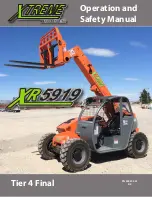
66
OPERATING THE LIFT TRUCK
The following are the recommended procedures that should be
followed before and while operating a UniCarriers lift truck.
Since the Occupational Safety and Health Act (OSHA)
29CFR1910.178(I) requires that “
only trained and authorized
operators shall be permitted to operate a powered industrial
truck
”, it is the owner/end user’s responsibility to comply. The following
is intended as a guide in training operators in safe lift truck operation;
it is not a training manual nor is it intended to preclude good judgment
and common sense.
For a complete listing of what should be covered in a training program,
obtain a copy of ANSI/ITSDF B56.1 Safety Standard for Low Lift and
High Lift Trucks.(www.itsdf.org).
INSPECTION BEFORE OPERATING
The OSHA regulation requires the operator to make a complete check
of the lift truck at the beginning of
each shift
or
work period
. Ensure
that all of the Daily Inspection checks (refer to page 89, also refer to
page 91 for Sample Operator’s Daily Checklist) have been made before
operating the lift truck.
LIFT TRUCK OPERATING PRECAUTIONS
1. Malfunction Displays:
If any error code appears on the meter
display contact your Local Authorized Dealer.
2. Warning buzzer:
This buzzer warns the operator by a continuous
sound that the operating procedures (start safety system operating)
and the dismounting procedures have not been followed.
PRECAUTIONS FOR COLD AND HOT WEATHER
IN COLD WEATHER
• Oil and Grease
Use engine oil and grease that are suitable for the ambient
temperature (refer to page 128).
• Coolant
When coolant might freeze at a low ambient temperature, drain out
the coolant completely (refer to page 95). In such cold weather a
recommended 50/50 mix of antifreeze solution only should be put
into the cooling system (refer to page 95).
IN HOT WEATHER
• Oil
Engine oil should be changed to summer type oil (refer to page
128).
• Coolant
Because the engine is more likely to overheat in hot weather, the lift
truck should be parked in a shaded area. Overheating sometimes
is caused by old, worn or cracked hoses, connections, loosened
radiator cap, or old, worn or cracked fan belt. Carefully check the
cooling system to maintain the best cooling effect.
• Battery
Because the battery electrolyte evaporates in hot weather, it is
necessary to refill the battery with distilled water (refer to page 88).
































